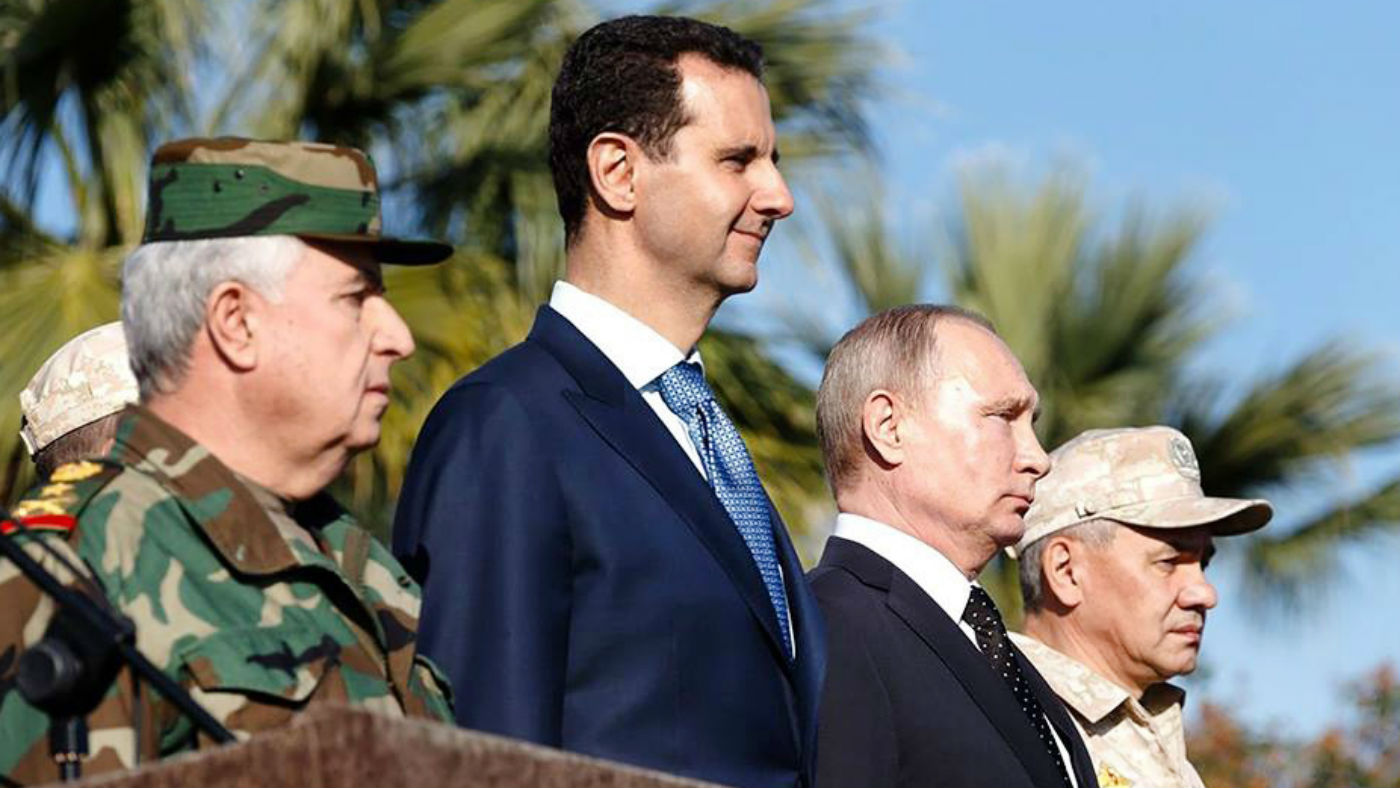Putin pulls his forces out of Syria
Analysts suspect he will not relinquish his growing influence in the region

A free daily email with the biggest news stories of the day – and the best features from TheWeek.com
You are now subscribed
Your newsletter sign-up was successful
Russia is to begin withdrawing its troops from Syria after Vladimir Putin declared his mission there complete.
In his first visit to Syria since the civil war began six years ago, the Russian President told servicemen at the Khmeimim air base that “the motherland is waiting for you”. They were returning back home “with victory”, he said.
The Russian army claimed last week that Syria had been entirely liberated from Islamic State forces. “Talk of the total defeat of Isis may be premature,” says The Guardian, “but there is no doubt that Russian air power, combined with Syrian forces and Iran-backed Shia militias on the ground, has decisively shifted the balance of power” in favour of President Bashar al-Assad.
The Week
Escape your echo chamber. Get the facts behind the news, plus analysis from multiple perspectives.

Sign up for The Week's Free Newsletters
From our morning news briefing to a weekly Good News Newsletter, get the best of The Week delivered directly to your inbox.
From our morning news briefing to a weekly Good News Newsletter, get the best of The Week delivered directly to your inbox.
The embattled leader was on the brink of defeat before Russia intervened in 2015, but his position is now so secure he was able to travel outside the country last month to meet Putin and offer him his thanks in person in Moscow.
With a Russian presidential election in March, Putin is keen to portray the Syria mission as a success. Rumours have been spreading that casualty reports were hushed up by Russian news outlets and recent polls have shown a growing majority opposed to a continued military presence in the country.
Signalling the end of Russia’s military operation in Syria “will go down well with Russian voters”, says the BBC’s Moscow correspondent Steve Rosenberg. And from a Russian point of view, it has been a success: as well as protecting a close ally, it also succeeded in “preventing Moscow’s international isolation” after the annexation of Crimea in 2014 sparked western sanctions.
“Putin has largely staked his legacy on Russia’s revival as the dominant military power in its region and a counterweight to the West in the Middle East”, says the Washington Post, and his surprise announcement kicked off a whirlwind tour, “which exhibited his growing diplomatic clout”.
A free daily email with the biggest news stories of the day – and the best features from TheWeek.com
Following his short stop-off in Syria, where he was met personally by Assad, Putin travelled to Cairo to meet Egyptian President Abdel Fatah al-Sisi. They discussed bilateral nuclear cooperation before Putin left for Ankara to meet Turkish President Recep Tayyip Erdogan.
The tour of his new Middle Eastern allies “underscored the extension of Russia’s influence in the region” and came as anger is running high over Donald Trump’s unilateral decision to recognise Jerusalem as the capital of Israel, “a decision that has helped isolate the US, angering allies in Europe and the Arab world while helping to convince the Arab public that the country is solidly anti-Muslim”, reports The New York Times.
-
 Political cartoons for February 20
Political cartoons for February 20Cartoons Friday’s political cartoons include just the ice, winter games, and more
-
 Sepsis ‘breakthrough’: the world’s first targeted treatment?
Sepsis ‘breakthrough’: the world’s first targeted treatment?The Explainer New drug could reverse effects of sepsis, rather than trying to treat infection with antibiotics
-
 James Van Der Beek obituary: fresh-faced Dawson’s Creek star
James Van Der Beek obituary: fresh-faced Dawson’s Creek starIn The Spotlight Van Der Beek fronted one of the most successful teen dramas of the 90s – but his Dawson fame proved a double-edged sword
-
 Putin’s shadow war
Putin’s shadow warFeature The Kremlin is waging a campaign of sabotage and subversion against Ukraine’s allies in the West
-
 Alexei Navalny and Russia’s history of poisonings
Alexei Navalny and Russia’s history of poisoningsThe Explainer ‘Precise’ and ‘deniable’, the Kremlin’s use of poison to silence critics has become a ’geopolitical signature flourish’
-
 What happens now that the US-Russia nuclear treaty is expiring?
What happens now that the US-Russia nuclear treaty is expiring?TODAY’S BIG QUESTION Weapons experts worry that the end of the New START treaty marks the beginning of a 21st-century atomic arms race
-
 Epstein files topple law CEO, roil UK government
Epstein files topple law CEO, roil UK governmentSpeed Read Peter Mandelson, Britain’s former ambassador to the US, is caught up in the scandal
-
 Iran and US prepare to meet after skirmishes
Iran and US prepare to meet after skirmishesSpeed Read The incident comes amid heightened tensions in the Middle East
-
 Syria’s Kurds: abandoned by their US ally
Syria’s Kurds: abandoned by their US allyTalking Point Ahmed al-Sharaa’s lightning offensive against Syrian Kurdistan belies his promise to respect the country’s ethnic minorities
-
 Israel retrieves final hostage’s body from Gaza
Israel retrieves final hostage’s body from GazaSpeed Read The 24-year-old police officer was killed during the initial Hamas attack
-
 China’s Xi targets top general in growing purge
China’s Xi targets top general in growing purgeSpeed Read Zhang Youxia is being investigated over ‘grave violations’ of the law